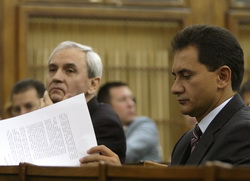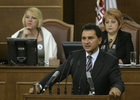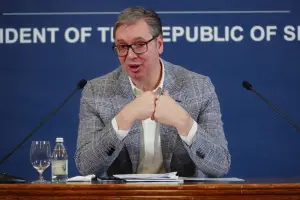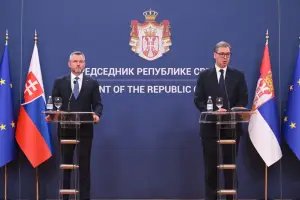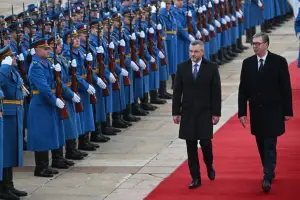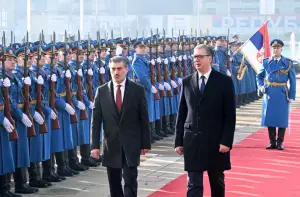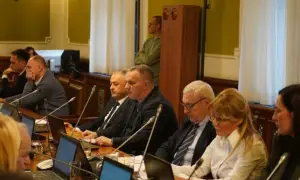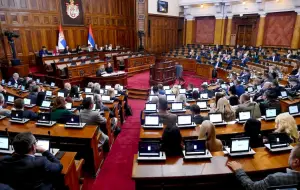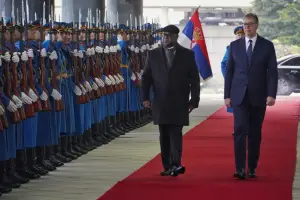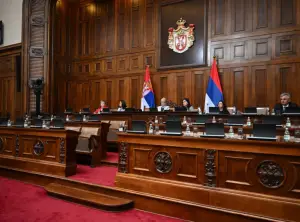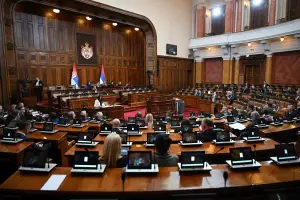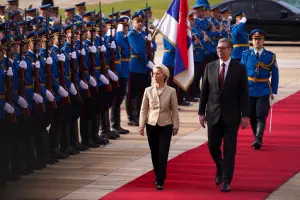Q:
A:
Parliament to discuss energy agreement
Belgrade,
5 September 2008
Serbian parliament will today discuss the second item on the agenda – the energy agreement with Russia – since at yesterday’s session 220 MPs finally agreed to endorse the Stabilisation and Association Agreement (SAA) with the EU.
Deputy Prime Minister Bozidar Djelic and Minister of Energy and Mining Petar Skundric will also attend today’s session.
Djelic called upon all parliamentary parties to vote for the energy agreement with Russia because it is in Serbia’s national interest.
By adopting this agreement Serbia will not lower economic or environmental EU standards, said Djelic adding that the agreement should neither be idealised, nor its huge importance undermined.
He voiced belief that the majority of MPs will endorse the energy agreement with Russia, just as they did with the SAA.
According to him, the energy issue is in the focus of all debates, and thanks to the arrangement with Russia, Serbia will become an important point on the European energy map.
The price of oil will continue to grow which is why Serbia needs strategic partners with oil sources whose interest is to develop Serbia’s oil industry, explained Djelic and added that Russia’s Gazprom Neft is the largest oil company in the world interested in advancing production capacities of the Serbian Oil Industry Naftna Industrija Srbije (NIS).
Djelic recalled that one of the obligations stemming from the SAA is trade liberalisation before 2010, which is why Serbian refineries must be ready for the process.
By ratifying the energy agreement with Russia, Serbia will acquire a strong partner and the agreement will attract investments of €500 million, he said noting that by cooperating with Russia, Serbia is not backing away from European standards.
Minister of Energy and Mining Petar Skundric said that the energy agreement with Russia is one of the crucial strategic projects in the next 30–50 years.
By accepting the agreement, MPs will create conditions for the development of the energy sector in Serbia, from which citizens and the economy will greatly benefit, he noted.
Elaborating on essential provisions of the agreement, Skundric said that an important advantage is stable gas supply to a large number of consumers in Serbia, which will ultimately result in more investments and better development of the country.
Skundric said he believes that in the next 5–7 years, Serbia will acquire a leading position in the region, increase GDP and improve conditions and the quality of life for its citizens.
Serbia currently has 170,000 households and 1,000 industrial consumers, and the Energy Development Strategy Before 2015 envisages an increase in households using gas to 400,000, specified Skundric.
Since 80% of gas consumers are in Vojvodina, we expect the rest of Serbia to reach that percentage, he stressed adding that the gas pipe line built so far enables over 100,000 consumers to be connected.
According to him, with additional connections, consumption will increase from 2.4 to 3.4 billion cubic metres of gas by 2015, though this estimate does not include potential gas power plants.
He recalled that the energy agreement envisages the construction of a main gas pipe line, an underground gas storage facility in Banatski Dvor, modernisation of NIS as well as collecting revenues for the passage of gas through Serbia.
Once it becomes a transit country for gas, Serbia will improve its geostrategic, economic and political position, said the Minister adding that thanks to this project Serbia will become a strategic partner to Russia and the EU.
He added that apart from the above-mentioned, there are numerous benefits stemming from this agreement and noted that the South Stream pipe line is planned for 2013.
The energy agreement with Russia, signed in Moscow on January 25 this year, envisages the construction of a main gas pipe line through Serbia, an underground gas storage facility in Banatski Dvor and modernisation of NIS, for which Russian Gazprom Neft offered around €900 million – €400 million for 51% of shares, and an additional €500 million in investments before 2012.
Djelic called upon all parliamentary parties to vote for the energy agreement with Russia because it is in Serbia’s national interest.
By adopting this agreement Serbia will not lower economic or environmental EU standards, said Djelic adding that the agreement should neither be idealised, nor its huge importance undermined.
He voiced belief that the majority of MPs will endorse the energy agreement with Russia, just as they did with the SAA.
According to him, the energy issue is in the focus of all debates, and thanks to the arrangement with Russia, Serbia will become an important point on the European energy map.
The price of oil will continue to grow which is why Serbia needs strategic partners with oil sources whose interest is to develop Serbia’s oil industry, explained Djelic and added that Russia’s Gazprom Neft is the largest oil company in the world interested in advancing production capacities of the Serbian Oil Industry Naftna Industrija Srbije (NIS).
Djelic recalled that one of the obligations stemming from the SAA is trade liberalisation before 2010, which is why Serbian refineries must be ready for the process.
By ratifying the energy agreement with Russia, Serbia will acquire a strong partner and the agreement will attract investments of €500 million, he said noting that by cooperating with Russia, Serbia is not backing away from European standards.
Minister of Energy and Mining Petar Skundric said that the energy agreement with Russia is one of the crucial strategic projects in the next 30–50 years.
By accepting the agreement, MPs will create conditions for the development of the energy sector in Serbia, from which citizens and the economy will greatly benefit, he noted.
Elaborating on essential provisions of the agreement, Skundric said that an important advantage is stable gas supply to a large number of consumers in Serbia, which will ultimately result in more investments and better development of the country.
Skundric said he believes that in the next 5–7 years, Serbia will acquire a leading position in the region, increase GDP and improve conditions and the quality of life for its citizens.
Serbia currently has 170,000 households and 1,000 industrial consumers, and the Energy Development Strategy Before 2015 envisages an increase in households using gas to 400,000, specified Skundric.
Since 80% of gas consumers are in Vojvodina, we expect the rest of Serbia to reach that percentage, he stressed adding that the gas pipe line built so far enables over 100,000 consumers to be connected.
According to him, with additional connections, consumption will increase from 2.4 to 3.4 billion cubic metres of gas by 2015, though this estimate does not include potential gas power plants.
He recalled that the energy agreement envisages the construction of a main gas pipe line, an underground gas storage facility in Banatski Dvor, modernisation of NIS as well as collecting revenues for the passage of gas through Serbia.
Once it becomes a transit country for gas, Serbia will improve its geostrategic, economic and political position, said the Minister adding that thanks to this project Serbia will become a strategic partner to Russia and the EU.
He added that apart from the above-mentioned, there are numerous benefits stemming from this agreement and noted that the South Stream pipe line is planned for 2013.
The energy agreement with Russia, signed in Moscow on January 25 this year, envisages the construction of a main gas pipe line through Serbia, an underground gas storage facility in Banatski Dvor and modernisation of NIS, for which Russian Gazprom Neft offered around €900 million – €400 million for 51% of shares, and an additional €500 million in investments before 2012.

